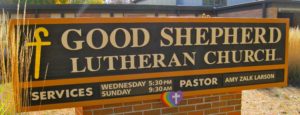Sermon For October 2, 2016 – “Help for Days Like This”
Twentieth Sunday After Pentecost
October 2, 2016
Good Shepherd Lutheran Church
Decorah, Iowa
Rev. Amy Zalk Larson
Click here to read scripture passages for the day.
Help For Days Like This
Beloved of God, grace to you and peace in the name of Jesus. Amen.
The Gospel reading today is so strange. It’s the kind of stuff you don’t want someone who’s skeptical of Christianity to hear. I mean, really: “If you had faith the size of a mustard seed, you could say to this mulberry tree, ‘Be uprooted and planted in the sea’, and it would obey you”? That sounds crazy. Outrageous claims like that can make people dismiss Christianity as sheer nonsense. And then Jesus says we’re supposed to call ourselves worthless slaves? Doesn’t that just fuel the mistaken notion that Christianity is all about shame and guilt, that it just makes people feel bad about themselves?
This reading is really strange and off-putting. It’s troubling that Jesus uses images of slavery to talk about the life of faith, especially amidst all the racial tension in our country. Other places in scripture we see how the message of Jesus is a critique and a challenge to the practice of slavery, but here Jesus simply uses a common image from his time to make a point. I wish he hadn’t done that as I’m sure this text has been used by slave owners to justify slavery. I wish he had always challenged slavery as contrary to his message that the last shall be first. This text can seem outdated, irrelevant, embarrassing and so very unhelpful. Yet, underneath all this strange language there is profound good news and wisdom that is both timeless and needed now more than ever.
The apostles are feeling inadequate. They don’t feel up to the task of living as Jesus’ followers so they ask Jesus to increase their faith. Jesus has been giving them hard teachings about the dangers of loving money and of causing others to stumble. Right before our story for today. Jesus tells them that if someone sins against them, even seven times a day, they must be ready to forgive, even seven times a day. The apostles are understandably a little daunted by this so they plead with Jesus, “increase our faith.”
Their plea resonates with many of us in these trying days in which we live. As we look at all the challenges in our world and all the questions about God that they raise, as we think about what is asked of us as people of faith in all roles we have, it all can be a little daunting and can leave us feeling pretty inadequate. We are often like the apostles, thinking we need to have more faith, stronger faith, growth in our faith in order to meet the demands of our world and the demands of each day. And you’d think that Jesus would be all about this impulse, saying to the apostles and to us. yes, finally, you want to get serious and grow in your faith. Let me help you do that. Instead Jesus tells the apostles, and us, that we have all the faith we need to be part of God’s work in the world- God’s work of uprooting injustice and transforming creation. This is good news that we need today even more than ever.
These days we are barraged by marketing that tries to tell us we’re inadequate. We’re constantly told that we need to have more and be more and so, need to consume more to help us grow. This carries over to our faith life as well. if we don’t feel strong in our faith, we should buy another book, or listen to some inspirational music, or find a new church that will make us better. In contrast, Jesus tells us that we have all that we need.
Jesus asks us not to focus on our sense of inadequacy but instead to get to work. Granted he says to get to work as slaves, which is problematic, but there is some important wisdom here that we need more than ever now. In an age when we’ve become dependent on positive reinforcement and the affirmation of others, Jesus tells us not to concern ourselves with getting thanked or being recognized for our work, but to put our faith into action. Rather than waiting until our faith is bigger, deeper, greater; rather than waiting to be acknowledged for having such a strong faith; we are to put our faith to work. Rather than waiting until we have all our beliefs figured out, or until we really feel a powerful sense of faith, we are to act on our faith.
As we act on our faith, we find that we have enough. As we show up to serve at the community meal, or to lead a small group of Sunday School kids, or to help flood victims, we find that our faith is sufficient. As we seek to carry out all our various callings – at home, at our jobs, in our families – with kindness and patience, we find that our faith can help us to love and forgive. We find that we can, and do, make a major impact on the landscape around us. Often it won’t feel like we’re making a difference. Often days will go by when there will be nothing to show for our labors. Often no one will say thank you, but that is OK. We are doing our duty and as we do, we find that we have all the faith we need to live out God’s call for our lives and to be part of God’s work in the world.
This Gospel reading has strange language but timeless wisdom that we need now more than ever. However, we also may need more current language to help us grasp it. So, I offer a portion of the poem “If I Should Have a Daughter” by Spoken Word poet Sarah Kay:
There’ll be days like this, my momma said.
When you open your hands to catch and wind up with only blisters and bruises; when you step out of the phone booth and try to fly and the very people you want to save are the ones standing on your cape;when your boots will fill with rain, and you’ll be up to your knees in disappointment.
And those are the very days you have all the more reason to say thank you. Because there’s nothing more beautiful than the way the ocean refuses to stop kissing the shoreline, no matter how many times it’s sent away.
We can keep on kissing the shoreline, we can keep on loving and forgiving, we can keep showing up for our part in God’s work even when no one says thank you, even when we are sent away. We have all that we need even for days like this.
Thanks be to God.






